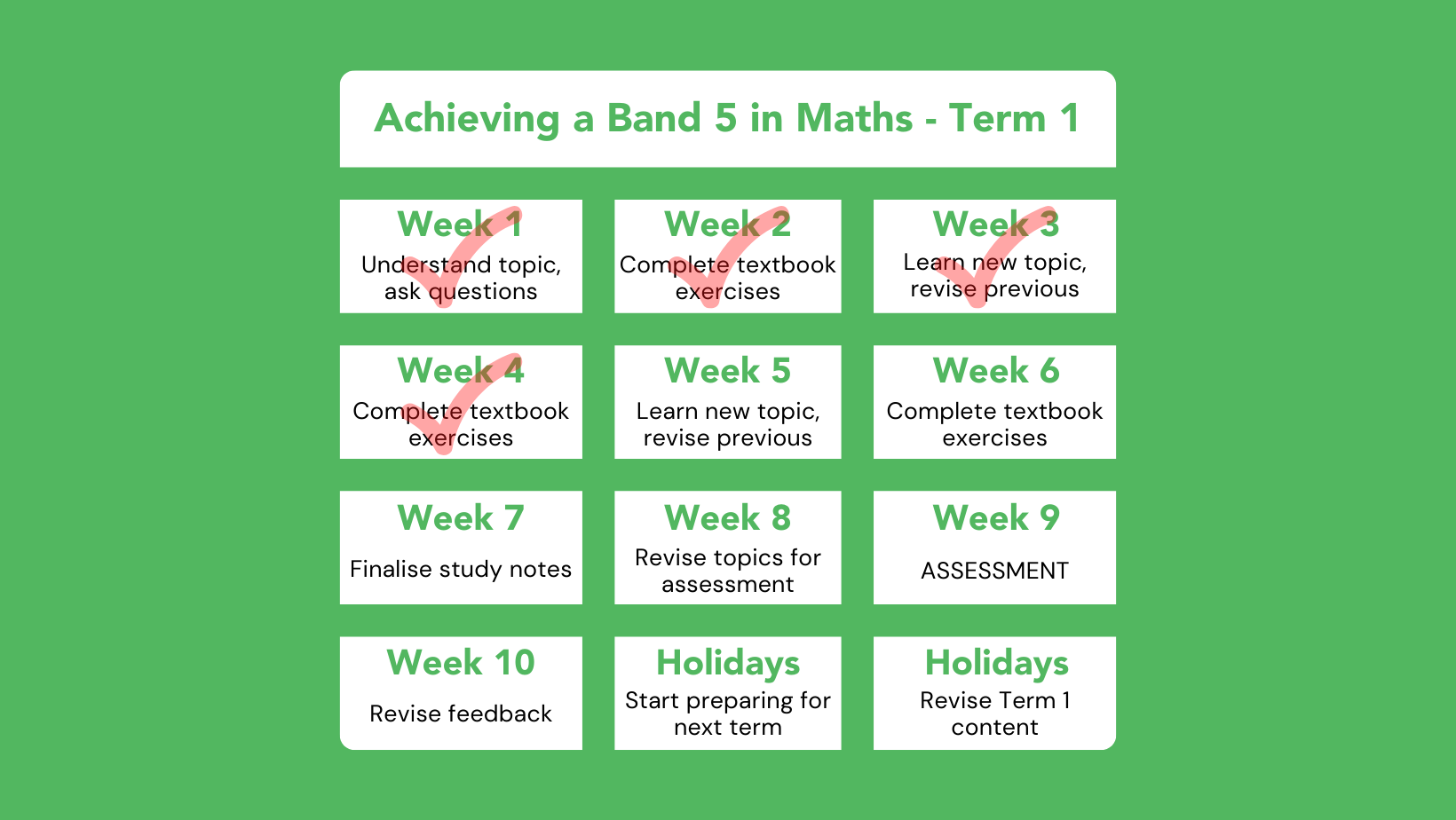Most parents want their child to do well in the HSC. You likely want to see your kids work hard and reach their highest potential, so you want to encourage your child to do their best without pushing too much.
Today, we are going to unpack some tips to help you to strike a balance between getting your child to study, and having them feel supported.
First, it’s important to note that each parent-child dynamic is different, and each student needs different types of encouragement. You know your child far better than we do, so make sure you chat with them and find what will work for both of you!
Let’s get started!
Engage in Helpful Dialogue
Tip #1: Ask How They Are Going
Tip #2: Remind Them of Their Goals
Tip #3: Ask If They Need Help to Do Things Differently
Tip #4: Provide Helpful Advice
Tip #5: Remind Them That Marks Reflect Work
Tip #6: Give Them a Pep Talk
What Not to Do
Engage in Helpful Dialogue
The best way to encourage your child (which, by the way, we mean in the fluffy sense and also in the sense that you get them to do enough work), is by framing your speech in a way that encourages constructive dialogue.
You want the relationship you have with your child to be a conversation where they feel engaged and responsible for their study. When this occurs, students will feel a sense of ownership over their schooling. They will also find it easier to determine what they are good at, and what study areas may need improvement.
Most importantly, they will feel well-supported if you are working as a team.
Here are some practical ways to do this!
Tip #1: Ask How They Are Going
Before you launch into any kind of “you need to study” speech, take a step back to find out how your child is progressing. It’s important that you find out how their preparation for assessments are going, in order to encourage your child effectively. Do they feel on top of it?
You should also check in on how they are going socially, and if there is anything it would be helpful for you to know about. Setting this tone early will really help the rest of your conversations to progress well!
This can be particularly helpful if you don’t fully understand the content your child is learning. You can provide a listening ear and create the open dialogue we want, which is often just as valuable.
Tip #2: Remind Them of Their Goals (and Reassess Them)!
Do you feel like this point does not apply, because you haven’t sat down and wired out some goals with your child? That’s your first task!
Academic goals are great, because they give students something tangible to aim for and stay on track. It also gives you something to encourage your child with and discuss when things get hard!
If you are creating goals, make sure they are progress based and not purely marks-based (you don’t want to be setting your child up to feel as if they failed, even if they worked hard!).
You want your child to have specific, measurable goals that are challenging but attainable. It’s also important to have a growth mindset, where your child sees setbacks as a way to improve.
Routinely check in with your child to find out what your child is currently working on, and if they are reaching their goals.
Try to make these chats about bite-size objectives that all add up to a bigger picture (for example, 25 mins of maths study a day fits into the broader objective of getting a Band 5 in Maths). You may create a visual tracker, like this:
This will help your child work through small tasks and constantly feel like they are achieving something, making them more motivated!
“They inspired self motivation through positive encouragement. They kept me accountable for my own dreams and goals, without forcing anything on me. As long as I could justify my actions to myself and them I was accountable.” — Scott (96.9 ATAR)
There’s a few really useful things picked up on by Scott. First, he and his parents had obviously talked about clear goals, and they are able to keep him on track. They also let him take responsibility for his study, but made sure he was progressing well by keeping him accountable for his actions.
Tip #3: Ask If They Need Help to Do Things Differently
If your child is not meeting their goals (or even if they are), make sure they know you’re available to help improve their study. The best thing you can do is actively ask what they need help with!
Some students will not be super astute in this. That’s where your inductive reasoning and parental instincts have got to kick in! If you notice your child is getting to bed really late, perhaps move their study sessions earlier. If they seem restless, ask them to join you in a walk before study!
As you fix routines together and see your child’s improvement, they will likely feel far more supported and able to reach their goals!
Tip #4: Provide Helpful Advice
Sometimes, your child may really want to hear your advice for studying or socialising (what a great feeling!). Other times, they may need some advice even though they don’t feel like it.
The best way you can give impactful advice is by identifying comments your child has made about their study and elaborating on their concerns to provide insight. This way, your child will feel heard by you, and their efforts validated, even if you are serving them a bit of a blow.
It’s also important that you are trying to give advice in a caring way that will actually be listened to. This way, you’ll both win, and you’re able to adequately encourage your child!
Tip #5: Remind Them That Marks Reflect Work
This is a tricky one, and needs to be taken on with caution.
On one hand, you want your child to recognise that how they perform in the HSC is entirely up to them and their effort — what they get out of the year is entirely in their hands! Be careful, though, of making this sound as if any bad mark your child gets is entirely down to their study. We all have different capabilities and strengths.
A good line is, “If you work hard, I’m proud of whatever marker you get,” as it both solidifies that they need to work hard and suggests that you still love them!
Kimberly (99.75 ATAR), explained how her dad struck this balance.
“My father was excellent at giving pep talks and reassuring me that I could do well, but always reminding me that I just needed to do my best and he would be proud.”
Tip #6: Give Them a Pep Talk!
One of the greatest things you can do to encourage your child is give them a bit of a pep talk to get the endorphins and motivation flowing!
Though your child may appear lazy or like they don’t care, there’s also a pretty good chance they are just burnt out, or demotivated. It’s really vital that they know you are there alongside them.
This kind of pep-talky encouragement should be multifaceted to achieve the best results, as you can see here.
“Ultimately, my parents showed utter support and kept reinforcing that no matter what, they’d be proud which was extremely helpful as it motivated me even more. When I didn’t do as well as I’d hope in a particular exam, they held me accountable but also showed me that if I knew the problem, I could fix it in the future.
“I learnt that every moment too, passes and that everything is temporary; capable of improvement in the future and each lesson learnt only strengthened my future responses. They supported me hence, by making sure that I was relaxed and rather than concerned with marks, concerned with understanding the work and syllabus.” — Danah (94 ATAR)
What Not to Do
Now that we know how to give the most helpful kinds of encouragement to our kids, let’s consider what we should try to avoid.
Our ultimate piece of advice is to not act out of frustration or frame your child’s progress in a negative way.
It can be super easy to get a little annoyed and throw around comments like “You need to study more!” or “You could have done better!”. However, this is not always the best way to respond because:
-
- It makes your child accountable to you, rather than responsible to themselves
- It focusses only on the negative rather than creating solutions
- It minimises potential for great dialogue with your child (like we just discussed!)
As your child grows into a young adult, especially in the HSC, it’s important that they have increased levels of responsibility. They will still, however, need your encouragement and guidance.
Responding well to their final years of school can be a great way to show your teen that you are on their side, caring for them.
And that’s it!
Now that you know the best way to encourage your child, hopefully you will be their rock through HSC, helping them to be positive and work hard.
Remember, if you’re positive, they’re most likely to be positive!
Natalie (97.05 ATAR) summed it up beautifully, so we will leave you with this!
“I can safely say that a most significant factor which influenced and motivated me throughout high school and my secondary studies has been the overwhelming support I have received from my parents. They would always try to ease my anxiety or stress by constantly encouraging me and simply telling me to just achieve my best, and not to focus so much on comparing myself or my marks to those of my classmates.”
Are you looking for some extra help for your child during the HSC?
We have an incredible team of HSC tutors and mentors!
We can help your child master their HSC subjects and ace their upcoming HSC assessments with personalised lessons conducted one-on-one in your home or at our state of the art campus in Hornsby or the Hills!
We’ve supported over 8,000 students over the last 11 years, and on average our students score mark improvements of over 20%!
To find out more and get started with an inspirational HSC tutor and mentor, get in touch today or give us a ring on 1300 267 888!
Lucinda Garbutt-Young hopes to one day be writing for a big-shot newspaper… or maybe just for a friendly magazine in the arts sector. Right now, she is enjoying studying a Bachelor of Public Communication (Public Relations and Journalism) at UTS while she writes on the side. She also loves making coffees for people in her job as a barista, and loves nothing more than a sun shower.






